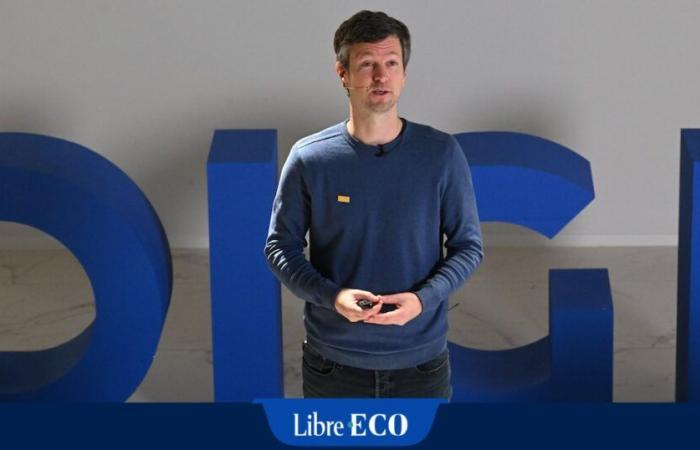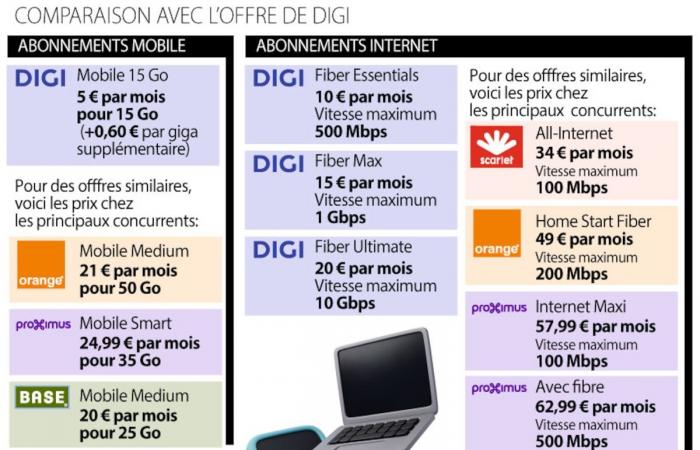Teeth grind
As for mobile rates, nothing to say, competitors will cringe.
With a unique mobile offer at 5 euros per month for 15 GB of mobile data (and an additional €0.60 per additional gigabit consumed), Digi not only does better than the competition, it crushes it. Its closest opponent in the segment, in terms of price, is Hey! (low cost from Orange), with 7 euros per month… for 5 GB. For Proximus, the Scarlet Mobile offer offers 8 euros per month… for 1 GB.
“No need to multiply offers. People get lost there. One offer is enough to meet the needs of 75% of the population“, advance Jeroen Degadt. “We can’t even compare in percentage… No need for packs, no need for promotions, our prices are already the most attractive”he congratulates himself. And difficult to find the little beast. Apart from the connection quality: Digi can only offer, for the moment, “only” 4G, since it rents the Proximus network. The operator, majority owned by the Belgian State, was not going to give it access to its 5G antennas to compete directly with its “premium” offer. “But we have an obligation to reach 30% 5G coverage by September 2025.”says the boss of Digi again, fangs visible.
Digi reveals its prices: what does the operator offer for 5 euros per month?
Meanwhile, discreet during the press conference, Fabrice Sancho, the CEO of Ericsson Belux, has a smile. It is precisely Ericsson which will install the Digi antennas. The freedom antennas, since they will allow you to free yourself from the Proximus network within five years (the duration of the “roaming” contract signed with Proximus). Around 5,000 antennas will need to be deployed. In the meantime, the Digi offer launched this Wednesday, via the Proximus network, is therefore accessible to everyone nationally in Belgium. This is not the case for the fixed offer.
gull“No need for packs, no need for promotions, our prices are already the most attractive”
But first, here are the offers for fixed internet. “Digi Fiber Essentials” offers a connection at 500 MBPS (megabits per second, in theory as fast for upload as for download) to 10 euros per month. Enough to suffice for the population who only wants to surf the internet, make some online purchases, or even a few video chats. The basic “fiber” offer from Proximus, the major player in fiber in Belgium at the moment, is more than 60 euros per month at the moment. Or six times more expensive. Coincidence or not, just after the launch of the Digi offer was made official this Wednesday afternoon, Proximus shares lost more than 7% on the stock market.
Then, with Digi Fiber Maxa 1 Gbps connection for 15 euroset Fiber Ultimate (10 Gbps) for 20 eurosDigi finishes burying the competition and even attacks the “premium” segment in terms of connection speed. “We don’t want to be just ‘cheaper’‘ (cheaper), but also ‘faster’ (faster)”, adds Jeroen Degadt. For the TV offer, he will present the offers soon.
Note, however, that the availability of the fixed internet connection remains very low. For the moment, 10,000 households have “access”, with the offer available if consumers wish, around a hundred of whom have already been able to test the offer for free in Anderlecht (Cureghem). “Fiber has also been deployed to 140,000 homes, but there are still technical steps to be taken. It will be for 2025“, advance Jeroen Degadt.
gull“We believe in competition. A single fiber network and several suppliers is not a real competition. We need several networks where necessary.”
“Installation is free. We can add wifi boosters if and only if it is essential. For access in other cities, it depends on policies. We do a little lobbying with the mayors. The cities most quickly ready for the permit level etc. will be the first served”, he specifies. “We believe in competition. A single fiber network and several suppliers is not a real competition. We need several networks where necessary“, he continues, when asked if he would sign with Proximus to expand its network.
First broken promise for the new operator Digi, forced to delay its launch: “We had some problems in Brussels”
“Here are the cheapest unlimited internet subscriptions from the three main operators in Belgium: 49 euros per month for Orange Home Start Fiber, 57.99 euros for Proximus Internet Maxi and 63.27 euros for Telenet All-Internet” (with connections not exceeding 500 Mbps), specifies Testachats, which is delighted with the arrival of Digi. We can only wish Digi to grow as quickly as possible in order to be truly accessible to as many people as possible. large number of consumers.
A necessity for the operator who promises “do not do an automatic increase“of its prices.”This is an introductory offer, but we hope to do better“, teases the CEO again. But when asked whether Digi will be strong enough to survive several years without profitability, he answers: “Network investments always take time and profitability occurs after several years (or even decades, Editor’s note), but we are confident“.
gull“There remains 75% of fiber to be deployed in Belgium, we might as well do that and open the sidewalks just once. It’s a societal question.”
Who are the citizens’ fears?
The installation of optical fiber aroused a lot of fear among certain citizens, who saw the cable installation operations on the facade. “This is why we would like a “DUCT cable” network (a kind of large, easily accessible ducts allowing one or more operators to multiply the number of cables or fibers, generally in shallow basements). There is still 75% of fiber to be deployed in Belgium, so we might as well do that and open the sidewalks just once. It’s a societal issue. This solution has already proven itself. And this gives customers freedom of choice.”says the leader. “The sector can also benefit from it, it will reduce investment costs if several operators use this infrastructure.he blurted. It remains to be seen which operator would put their hand in their pocket first…
The opinion of the BIPT president
With a serious look, Michel Van Bellinghen, the president of BIPT (the telecoms regulator) stands up at the end of Digi’s presentation. “We’ve been waiting for six years“, he says. Six years since the request to examine avenues for improving the market for consumers. A request from the BIPT which dates back to June 15, 2018. “It was the political discussions that made it take so long.“, he slips. “Although the possibility of a fourth operator entering the market was validated very quickly by the federal government, the question of the distribution of auction revenues delayed its implementation for several years.“, he says. For those who have not followed, this is the revenue from the spectrum auction, i.e. from the mobile network in Belgium. An auction was carried out in 2022, at which Digi participated, but political battles over who would get what at the regional and local level threw sand into the works.
But therefore man rejoices. And regarding fixed internet and fiber deployment, he answers: “Opponents of the installation of cables on their facade think that they can oppose the laying of fiber, but no. They can just ask to adapt the way and the place. But the law (from 1991, Editor’s note) provides this possibility of laying cables for all operators“, he explains. And what about the fear of seeing the number of cables explode in the future on facades, as in Romania, country of origin of the parent company Digi? “This fear of erratically installed cables needs to be alleviated. This will not happen, there are clear planning regulations“, he says.
Zoltan Teszari, former judo champion and future telecoms champion in Belgium?
Finally, as a reminder, Digi Belgium, born from a joint venture between the Romanian low-cost operator Digi and the Belgian Citymesh (B2B network specialist), employs around 300 people in Belgium, some of whom are currently freelance.







